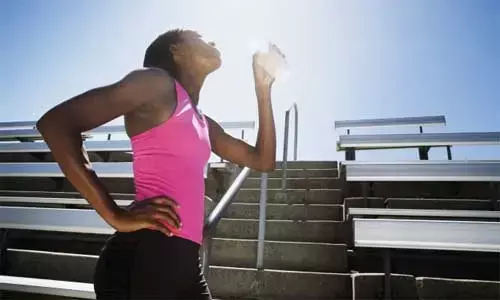- Home
- Medical news & Guidelines
- Anesthesiology
- Cardiology and CTVS
- Critical Care
- Dentistry
- Dermatology
- Diabetes and Endocrinology
- ENT
- Gastroenterology
- Medicine
- Nephrology
- Neurology
- Obstretics-Gynaecology
- Oncology
- Ophthalmology
- Orthopaedics
- Pediatrics-Neonatology
- Psychiatry
- Pulmonology
- Radiology
- Surgery
- Urology
- Laboratory Medicine
- Diet
- Nursing
- Paramedical
- Physiotherapy
- Health news
- Fact Check
- Bone Health Fact Check
- Brain Health Fact Check
- Cancer Related Fact Check
- Child Care Fact Check
- Dental and oral health fact check
- Diabetes and metabolic health fact check
- Diet and Nutrition Fact Check
- Eye and ENT Care Fact Check
- Fitness fact check
- Gut health fact check
- Heart health fact check
- Kidney health fact check
- Medical education fact check
- Men's health fact check
- Respiratory fact check
- Skin and hair care fact check
- Vaccine and Immunization fact check
- Women's health fact check
- AYUSH
- State News
- Andaman and Nicobar Islands
- Andhra Pradesh
- Arunachal Pradesh
- Assam
- Bihar
- Chandigarh
- Chattisgarh
- Dadra and Nagar Haveli
- Daman and Diu
- Delhi
- Goa
- Gujarat
- Haryana
- Himachal Pradesh
- Jammu & Kashmir
- Jharkhand
- Karnataka
- Kerala
- Ladakh
- Lakshadweep
- Madhya Pradesh
- Maharashtra
- Manipur
- Meghalaya
- Mizoram
- Nagaland
- Odisha
- Puducherry
- Punjab
- Rajasthan
- Sikkim
- Tamil Nadu
- Telangana
- Tripura
- Uttar Pradesh
- Uttrakhand
- West Bengal
- Medical Education
- Industry
Management of Exercise-Associated Hyponatremia: WMS Guideline update

Wilderness Medical Society has released its 2019 Update of Clinical Practice Guidelines for the Management of Exercise-Associated Hyponatremia. The same has appeared in the Journal of Wilderness and Environmental Medicine.
Exercise-associated hyponatremia (EAH) has been recognized as an important cause of preventable morbidity and mortality in endurance and other physical activities throughout the world. It has been documented in hikers, trekkers, climbers, and cold climate endurance athletes also. Thus, EAH is not solely associated with activities in warm climates but is reported in both environmental extremes.
Major Recommendations are-
- Participants and medical staff should be educated about proper hydration strategies for exertional activities. Recommendation grade: 1C.
- Participants in endurance athletic events or strenuous wilderness activities should focus on avoiding overdrinking during the activity. Recommendation grade: 1A.
- Participants should drink according to thirst, or they should determine an estimation of their individual fluid needs during pre-event training activities (by assessing body weight losses per hour), which limits the potential for weight gain. Recommendation grade: 1C.
- Sodium and/or salty snacks should be freely available for consumption along with the appropriate fluid intake, particularly in long, hot events in non–heat acclimatized persons, but this strategy will not prevent EAH when combined with overdrinking. Recommendation grade: 2B.
- When available, point-of-care testing should be done on at-risk, symptomatic patients. If unavailable, integrate all available clinical and historical information into an assessment of the patient's hydration status (history of fluid intake, food intake, presenting signs and symptoms, body weight if available, and urine output). Recommendation grade: 1C.
- Oral fluid restriction is indicated if EAH from fluid overload is associated with mild symptoms. Hypotonic fluids are contraindicated with suspected EAH. Recommendation grade: 1C.
- Oral sodium in hypertonic solutions or foods with high sodium content (salty snacks) may increase serum sodium levels and enhance symptom relief (over fluid restriction) for mild EAH if tolerated. Recommendation grade: 2B
- Observe patients for at least 60 min after exercise to ensure no decompensation from delayed symptomatic EAH after cessation of exercise. Recommendation grade: 1C.
- IV hypotonic fluids are contraindicated with suspected fluid overload EAH. Recommendation grade: 1C.
- Isotonic fluid intake should be restricted in known or suspected severe hypervolemic EAH until urination begins. Recommendation grade: 1C.
- An IV bolus of 100 mL of HTS should be administered immediately if signs and symptoms of encephalopathy (with or without noncardiogenic pulmonary oedema) develop and severe EAH is strongly suspected. Recommendation grade: 1C
- When transferring care, receiving caregivers should be alerted to the potential diagnosis of EAH and appropriate fluid management (withhold hypotonic fluids). Recommendation grade: 2C.
- Oral and IV hypotonic or isotonic hydration should be avoided early in the management of EAH, although it may be appropriate in certain clinical contexts once sodium correction has been initiated or hypovolemia is confirmed. Recommendation grade: 1C.
- With suspected EAH, and particularly in those with altered mental status, sodium estimation should be obtained as rapidly as possible after hospital arrival. Recommendation grade: 1A.
- A rapid assessment for signs and symptoms of cerebral edema or noncardiogenic pulmonary edema should be done in all patients with possible EAH. Recommendation grade: 1A.
- Severe EAH biochemically confirmed or symptomatic EAH should be treated with a 100-mL bolus of IV HTS, which can be repeated twice at 10-min intervals (3 doses in total) or until improvement of neurologic symptoms, with the aim of acutely increasing serum sodium concentration by about 4 to 5 mmol·L-1 and reversing cerebral oedema. Recommendation grade: 1A.
There is an ongoing need for education to ensure that participants understand the risk of overhydration. Furthermore, a knowledge gap persists internationally among practitioners and prehospital EMS personnel about the assessment and treatment of EAH, which is compounded by many of its nonspecific presenting signs and symptoms.
For further reference log on to:
DOI: https://doi.org/10.1016/j.wem.2019.11.003
Dr Kamal Kant Kohli-MBBS, DTCD- a chest specialist with more than 30 years of practice and a flair for writing clinical articles, Dr Kamal Kant Kohli joined Medical Dialogues as a Chief Editor of Medical News. Besides writing articles, as an editor, he proofreads and verifies all the medical content published on Medical Dialogues including those coming from journals, studies,medical conferences,guidelines etc. Email: drkohli@medicaldialogues.in. Contact no. 011-43720751


